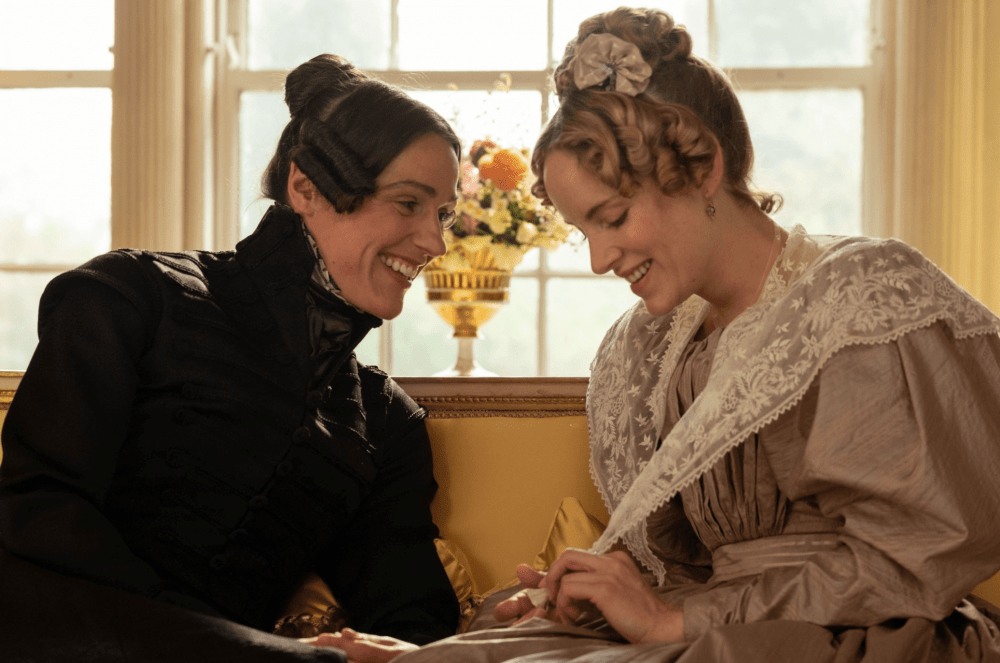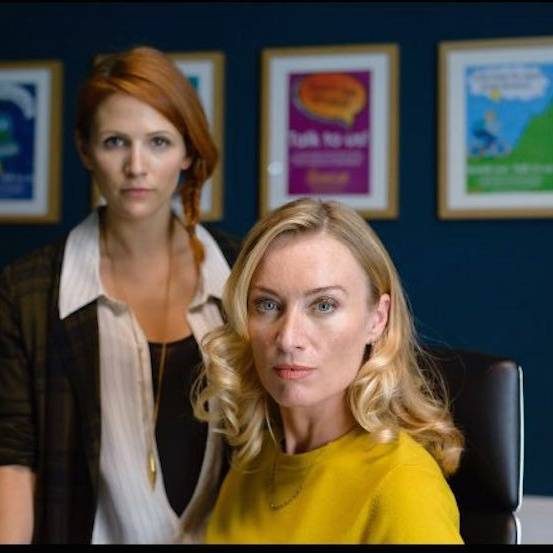
The true story of lesbian landowner Anne Lister
Created/directed and written by Sally Wainwright (Happy Valley, The Last Tango in Halifax) and starring BAFTA award-winner Suranne Jones (Doctor Foster, Save Me, Vanity Fair), Gentleman Jack is a fresh, smart, and funny take on the diaries of Anne Lister, 19th-century lesbian landowner who defied the gender conventions of her time and was determined to live an independent life with a loving wife by her side.
This series is a passion project that Sally Wainwright has been working on for over 20 years, after discovering a book about Lister and her history in the town where Wainwright herself lived and yet where she had not heard anything about this remarkable, pioneering woman.
This eight-episode period drama series — with a contemporary twist of sex and humour — is set in 1832 Halifax, England, the epicentre of the industrial revolution. Landowner Anne Lister is attempting to preserve the history of the family seat, Shibden Hall, by promptly collecting tenants’ rent and opening the coal mines that will ensure her financial future. She also has a personal ambition of finding true love and marriage — to a woman.
Lister is a charismatic, brilliant, and opinionated real-life lesbian who went toe-to-toe with male adversaries and who left behind 27 volumes of journals (much of it written in a secret code, especially where her lesbian adventures were concerned). Played by the gorgeous Suranne Jones, Lister’s quest to gain the life she envisions propels eight delightfully written episodes as she convinces those around her that her ambitions are not unreasonable or unorthodox.
After a heartrending rejection from a female lover who accepts a proposal to marry a man, and attempts casual sex with a female friend who calls her “Freddy,” Lister soon sets her sights on timorous blonde heiress Ann Walker (Sophie Rundle) and goes about wooing her to become her wife.
Lister intends to marry Walker in secret and live as companions, despite the disapproval they may face. But the course of true lesbian matchmaking doesn’t run smooth…
This isn’t fiction. Every part of the series is meticulously based on fact, as recorded in Lister’s diaries, which Wainwright herself even began transcribing when she realized so little of the four million words had been decoded or published.
While Wainwright grew up in Halifax in the 1970s where Lister wasn’t spoken of let alone celebrated, once she read a book about her in 1998 Wainwright “knew straight away that I wanted to write about her.” She started reading the diaries, including the sections written in a secret code and had many of the volumes transcribed to faithfully create the source material for the show.
There is so much material, including revelations about Lister’s female lovers, that Wainwright is praying for a second season.
Suranne Jones and Wainwright had known each other for 10 years professionally and Jones read for and won the part, feeling some outrage that they hadn’t previously known more about this extraordinary woman. “It felt very immediate and exciting,” said Jones.
“Even on the page, the style of the period drama was so different from anything else I’d done — it was so modern, it had humor, it was accessible, it took you on a journey in a way I hadn’t felt before.”
Even today, Lister’s intelligence, self-confidence, and belief in her own sexuality feel groundbreaking.
“Anne Lister was phenomenally intelligent. She had a fantastic mind and a really positive outlook on life. Life was for living, grabbing it by the balls and getting on with it,” says Wainwright. Onset, filming at Shibden Hall, which was built in 1452, Wainwright said they “were conscious that we were walking in her footsteps.
This woman really did these things in these rooms, in this house. We were super-conscious of the privilege of being in this part of the world and this building that means so much to me.”
“She had really robust mental health, a really healthy sense of her own self-worth, and of her sexuality as well. She didn’t regard it as a burden or as a problem,” says Wainwright. “She accepted that was who she was and she had a really healthy attitude toward it.
She explored it. She knew she was different and she wanted to find out why she was like she was. She was as curious about that as she was about everything else in the world.”
“There was no blueprint for who she was,” says Jones. “There was no community. Lesbian wasn’t a word then, so she was just feeling her way and being authentic.
I find that amazing to have this robust mental health and to have the diary which she describes as: ‘What comfort my journal is.’ She could then live her life the way that she lived it. We know that in 1834 she married — albeit in secret — Ann Walker. I still find that mind-blowing.
“She absolutely wanted a wife and all that came with that. It was difficult. We watched Ann Walker’s coming out story, her not so stable mental health around that we watch the homophobic attitudes in society, homophobia towards oneself — it’s all explored and it’s done beautifully.
She was an amazing businesswoman on top of all that. She sunk coal pits. You could go on and on about how amazing this woman was, it’s kind of overwhelming.”
Wainwright introduces Lister to viewers with a bang. “We know Anne Lister could drive stagecoaches and mail carriages,” says Wainwright. “Anne Lister driving the high flyer into town — I thought that was a good way to introduce her.”
The episodes are also rollicking good fun with Jones breaking the fourth wall with a cheeky direct address. “I really wanted this to not feel like a traditional English period drama. I wanted it to feel a lot more modern and contemporary.
So that was to do with that idea that she talked to this machine [the camera] that didn’t exist in 1832. I thought that was quite cheeky. But when you’re reading the journal on the page you know you might be the first person to see that since Anne Lister wrote it. Because so much of it hasn’t been transcribed.”
“When you’re reading the code it’s like a stream of consciousness, it’s very emotional often. it’s quite an intimate experience. It’s like she’s talking straight to you. For me, that was the only way to recreate cinematically that sensation,” says Wainwright.
Wainwright pushed Jones to make Lister larger than life because she was. Big gestures, a fast, energetic, stride. Through rehearsals and readings of the script, Jones got to a point where it felt completely natural.
“She’s one step ahead of everybody,” says Jones. “This woman is so fascinating. There are quirks about her — she went to a prison to try a treadmill because she fancied it. She climbed a mountain.”
“In the Pyrenees,” adds Wainwright, “and beat the Prince of Moscow by half an hour.” Another fascinating tidbit Wainwright shares is that the diaries suggest that when Lister was 19 her father paid “a person” to spend the night with her.
Wainwright’s reading is that the father paid a prostitute to bed his daughter as a way of helping her…come into her own. It was a dysfunctional family, but they seemed to know about Lister’s sexuality although they never spoke about it because there was no language for it. “there was a tacit acceptance of her,” says Wainwright.
“She was so capable, she ran the estate so well that they couldn’t really argue with her.”
And so the series, which enjoys a roster of all-female directors and executive producers, is largely uncompromising in its portrayal of a real-life gay woman, almost 200 years ago, attempting to have it all.





